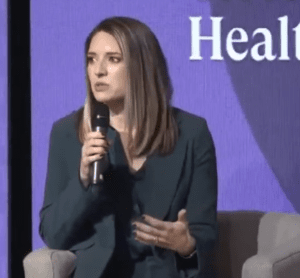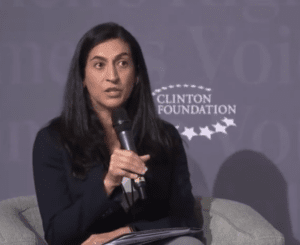Two UAMS Physicians Discuss Maternal Mortality, Mental Health at Women’s Voices Summit
| Two physicians at the University of Arkansas for Medical Sciences (UAMS) joined national and global leaders in a daylong Women’s Voices Summit, held earlier this month at the William J. Clinton Presidential Center in Little Rock and livestreamed internationally.
Former Secretary of State Hillary Rodham Clinton and Clinton Foundation Vice Chair Chelsea Clinton convened groups of panelists from across the public and private sectors for “Women’s Voices, Women’s Votes, Women’s Rights.” The panelists included Nirvana Manning, M.D., chair and associate professor in the UAMS College of Medicine Department of Obstetrics and Gynecology, and Jessica Coker, M.D., an associate professor in the UAMS Department of Psychiatry and the Department of Obstetrics and Gynecology.
The Dec. 2 summit featured discussions on a wide array of issues affecting women, including such health care concerns as maternal mortality and mental health. Other sessions focused on voting rights, the economy and global issues.
During the health care portion of the summit, Manning joined Christy Turlington Burns, founder and president of Every Mother Counts, to share insights on the maternal health crisis in America.
Manning said that in Arkansas, “as with most rural states, we have an access problem. We have 37 delivering hospitals, which is down from 39 at the beginning of the pandemic. We need every one of these delivering hospitals to be able to provide care for the patients throughout our state.”
Manning sits on a state maternal mortality board, which the Legislature established in 2019 to review each maternal death in Arkansas.
“In 2020, there were 30 maternal deaths,” she said, “and that’s defined as from birth to 365 days of life. As we look through each of those cases and really break it down, you’ll see statistics like 92% are preventable. Those are astounding statistics.”
She continued: “And it’s not what you would think. I would hope that a suicide is preventable. I would hope that an untimely death due to a maternal condition that didn’t get addressed in the postpartum period because of a lack of coverage is preventable.
“So when we talk preventable, it’s individual, it’s hospital, it’s community, it’s all of us. And so having access to those hospitals for these really ‘never’ events and equipping those hospitals with the knowledge, the policies, the protocols, the standardization to deal with these in real time is one of our biggest obstacles.”

Jessica Coker, M.D., an associate professor in the UAMS Department of Psychiatry and the Department of Obstetrics and Gynecology, discusses the impact that mental health issues, primarily trauma, have on women in their childbearing years.
Burns, a model and filmmaker who established her organization in 2010 to help women and girls who lack access to the health care that saved her from postpartum hemorrhaging, said the medical community knows what is needed to keep women safe through pregnancy and the postpartum period, “but we haven’t made a commitment at the global or national level that it is at the priority that it should and must be, especially with the ranking of this state and this country, which is the only high-resource country with a rising mortality rate. It’s just unacceptable.”
Arkansas ranks as one of the worst states in America for maternal health. In the U.S. Centers for Disease Control and Prevention’s 2018 comparison of 26 states with available data, Arkansas had the highest maternal mortality ratio.
Chelsea Clinton, who narrated the panel discussion, asked Burns why her organization focused on Arkansas.
Burns replied, “The ranking was what really opened our eyes. My team came down over a year ago to start meeting with folks like Dr. Manning and other community-based experts on the ground. We identified these amazing women to be able to start to unpack why the state is struggling, and the rural nature of the state is a big part of it.”
She said the documentary team found that hospital closures also played a role, as did “provider gaps” that keep some women from accessing quality care, adding that postpartum care has only recently been given more attention.
Burns said a film she’s making in Arkansas “focuses on the movement to extend Medicaid coverage to a full year postpartum.” She said 50% of maternal deaths happen when the baby is between seven days and a year old, “so this is a critical time when you can’t just stop caring for women and families.” She said continuing care needs to include mental health care.
Coker, who was one of four panelists on another health care panel, agreed that mental health issues, primarily trauma, have a profound effect on women in their childbearing years.
“The two most devastating effects of trauma that I see daily are drug use and suicide,” Coker said. “One thing I want to make sure everyone in this room knows is that the two leading causes of women dying after childbirth are drug use/overdoses and suicide.”
Manning noted that half of the pregnancies in Arkansas are to women on Medicaid, which ceases coverage at 60 days, when “we’re still upside down as new parents. We’re trying to survive.”
She advocated extending Medicaid coverage so that women can get contraceptive and preventative care, “so that when they do become pregnant and choose to become pregnant again, they can be in the best state of health for that next pregnancy.”
Calling Manning’s statistic about preventable maternal deaths “gut wrenching,” Chelsea Clinton asked her, “How do you see us getting from where we are here in Arkansas to where we need to be, to help ensure that every mother’s life does count, while she is expecting, as she’s delivering and in that critical year following?”
Manning said the answer involves many factors, but that Arkansas recently became the 48th state to join the Alliance for Innovation in Maternal Health Care (AIM), a national quality improvement initiative that supports best practices to make births safer, improve maternal health outcomes such as mortality and postpartum infection, and save lives. She said that allows for the creation of a network of delivering hospitals throughout the state that can share known effective protocols.
“We just need to disseminate that information to all our delivering hospitals to make sure” that if a problem arises, “they know how to act swiftly, they know that there are resources that will help them and that we can support those hospitals, those providers, those nurses that may be turning over very quickly,” she said. “Some of that is that community health care workers are just so needed in these communities. As we talk about rural Arkansas, where there may not be a hospital within 50 to 100 miles, we need people on the ground that can coordinate that care.”
Manning said it’s also important “to listen to these moms” and to address racial disparity, which is highlighted by statistics showing that Black women are more than four times more likely than their counterparts to die during childbirth.
Manning said the cause needs to be investigated. She added, “I think there is a distrust in the health care system, and we need to figure out how we can address that,” including hiring more Black health care providers.
Manning said she thinks the momentum exists now, “especially in the state of Arkansas, to help women be safer and take better care of themselves and their families.”
The Women’s Voices on Health panel on which Coker participated included McGill Johnson, president and CEO of Planned Parenthood Federation of America; Joy St. John, executive director of the Carribean Public Health Agency; and M.K. Pritzer, the first lady of Illinois. It was moderated by Chelsea Clinton.
Asked by Clinton to weigh in about the things that women worry most about, Coker said, “I think one thing that I’ve been struck by, not only at work but even during this conference, is one word that is a common thread through all of this, and it’s trauma. Women have experienced trauma for generations upon generations and it’s continuing today.”
Coker said women are more likely to be victims of emotional abuse, sexual trauma and sexual harassment.
“You saw the Me Too movement,” she said. “And I know that a lot of women in this room have experienced trauma, and what I’m thankful for is a good level of resilience amongst a lot of women who have experienced trauma and use that to activate themselves.
“However, there are a lot of women who continue to live in trauma every single day and struggle with mental illness, and they don’t have the same capacity to activate. I’m fortunate to see those women on a daily basis and talk to them and hopefully be a validating source in their life. But I think we have to do a better job of supporting our communities, supporting our women who are being traumatized. We have to do a better job of getting these women resources and recognizing that trauma has lasting impacts on your physical and mental health.”
To watch any part of the discussion, go to: https://www.clintonfoundation.org/womensvoices#

